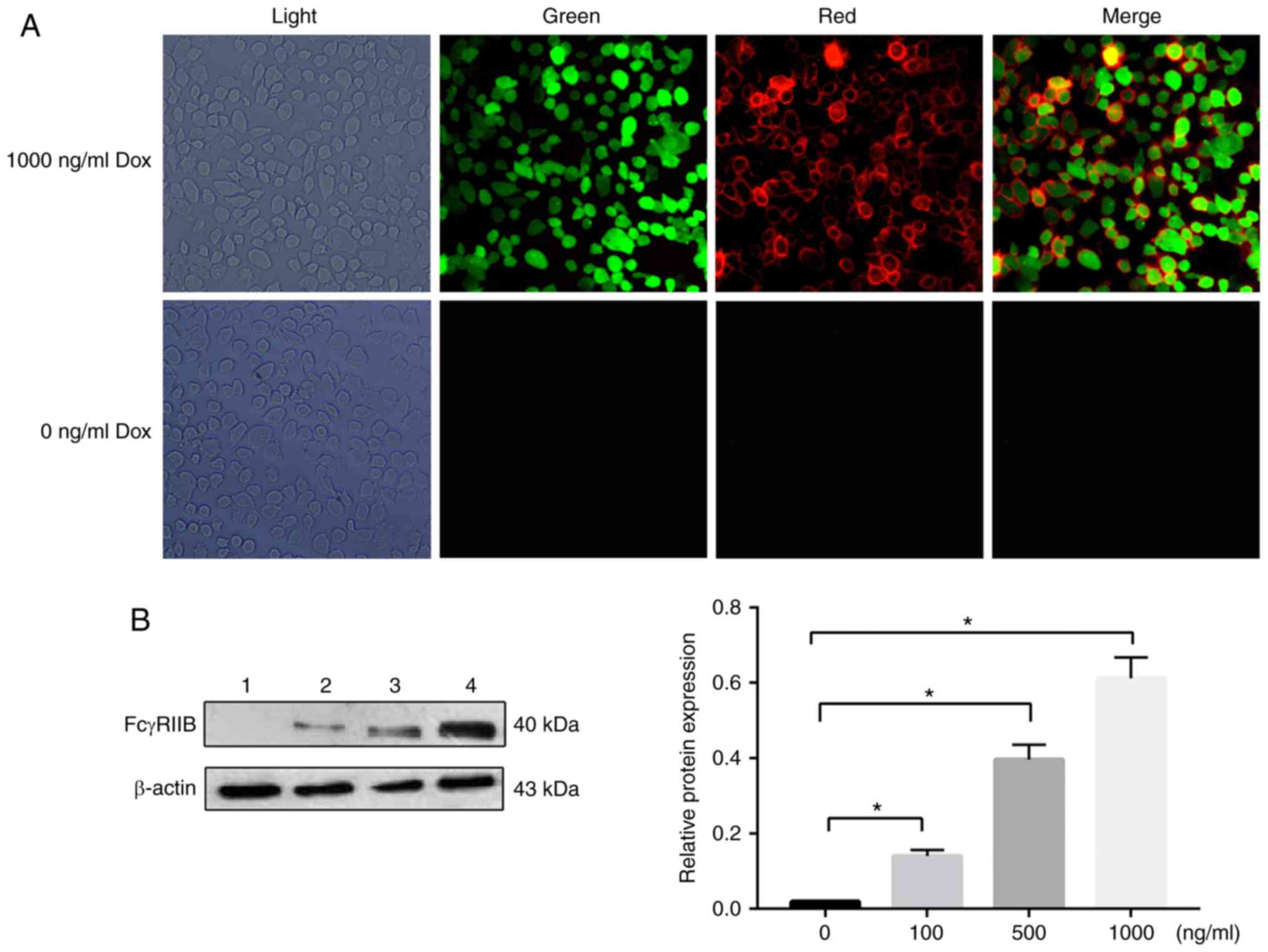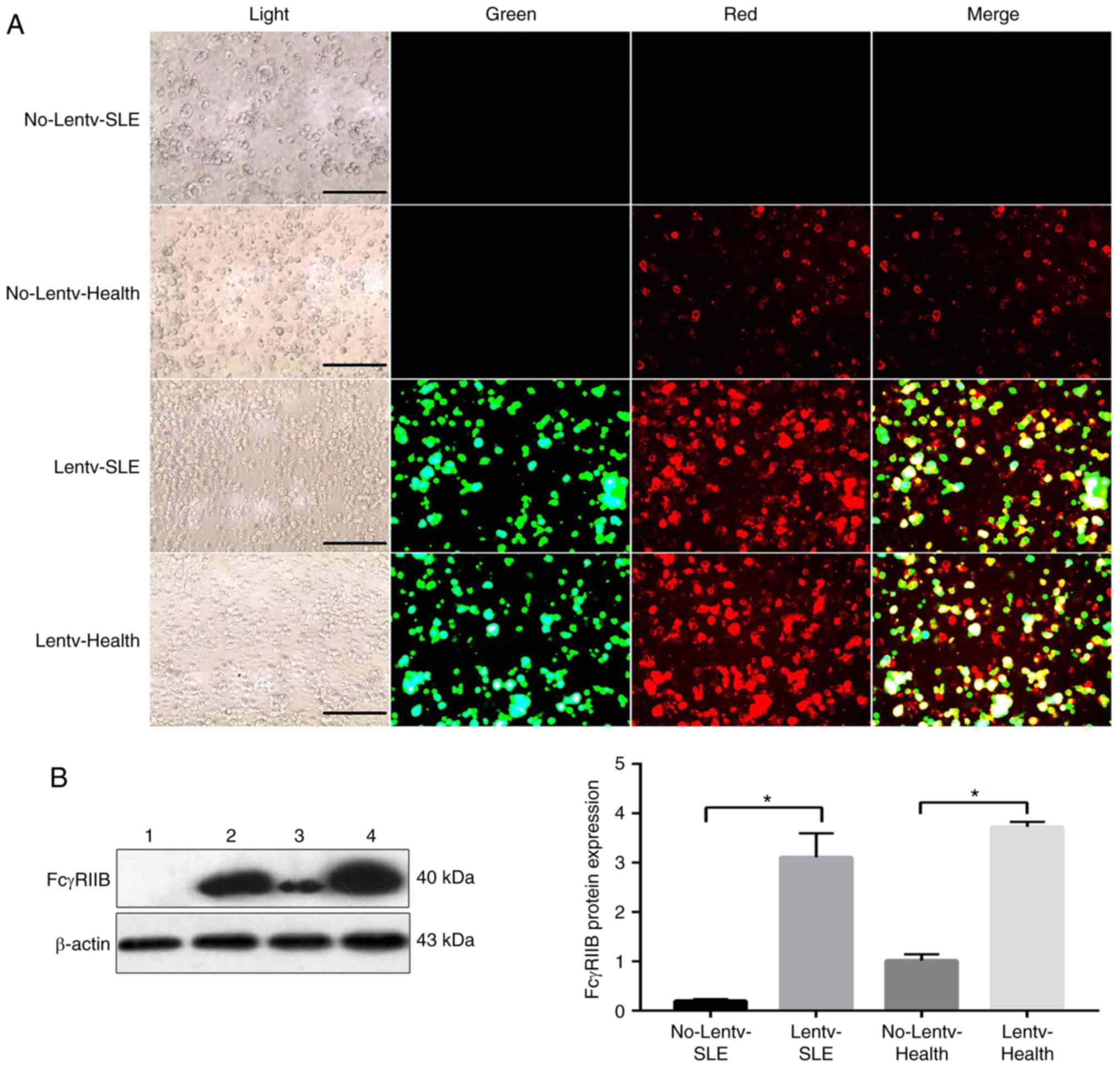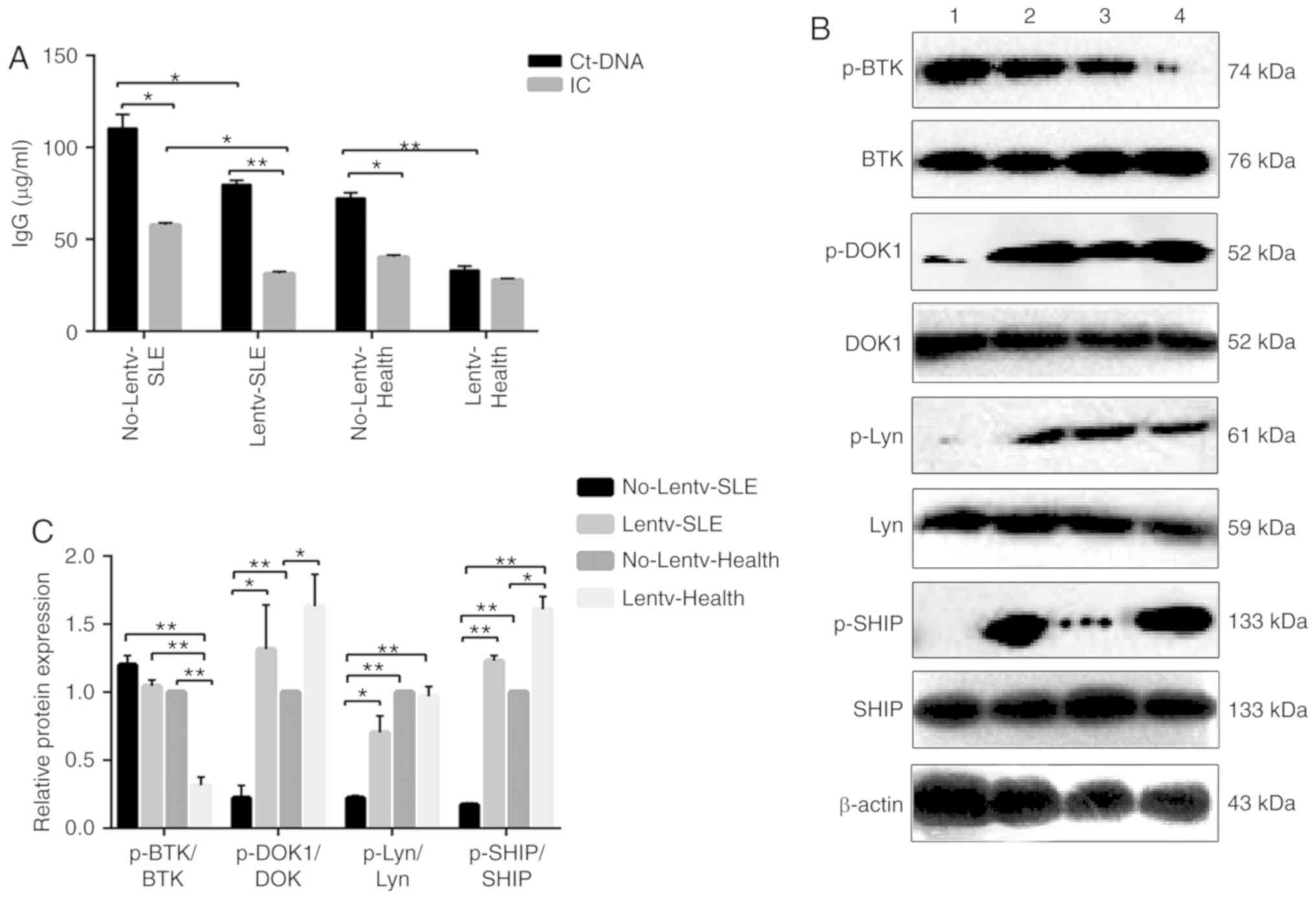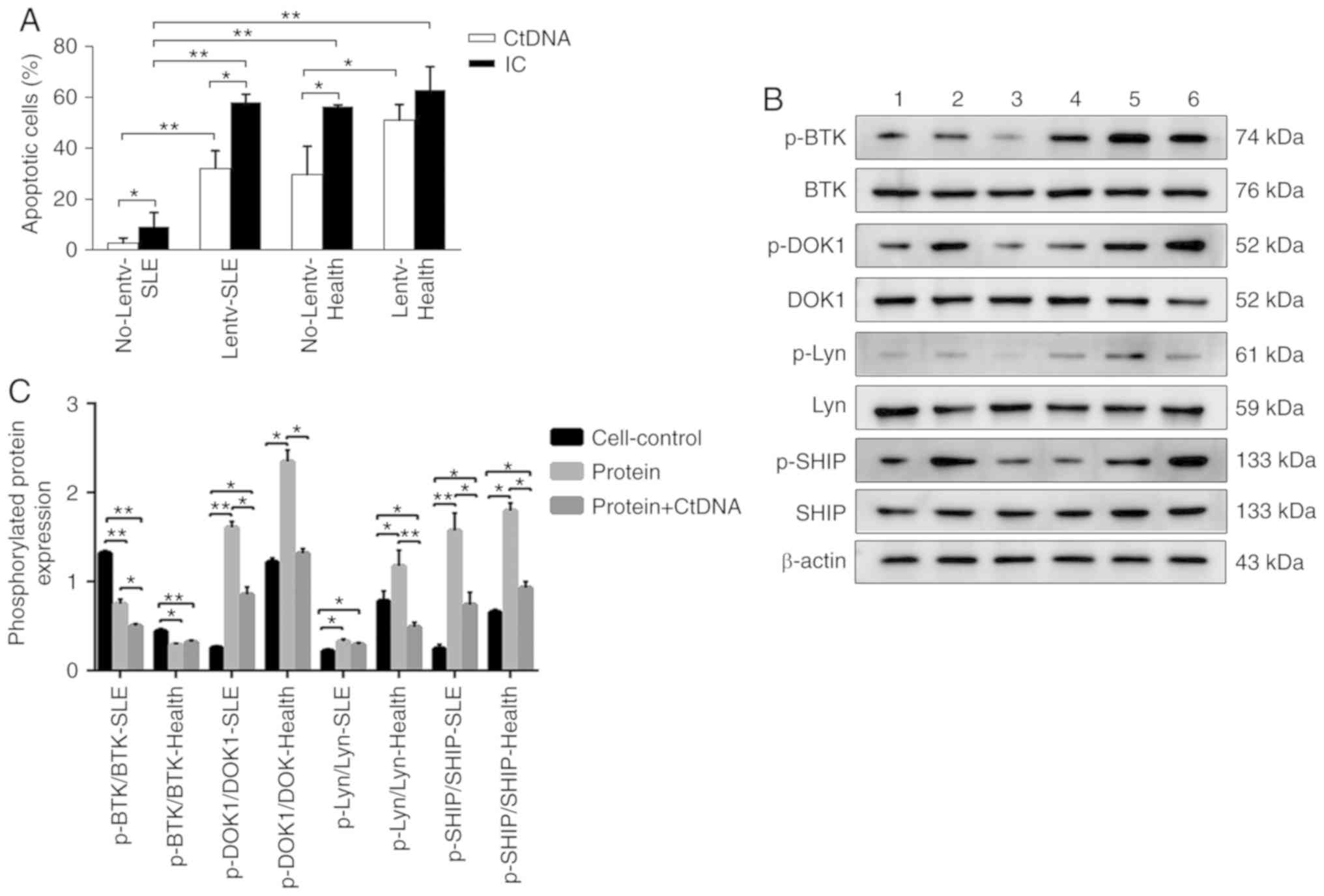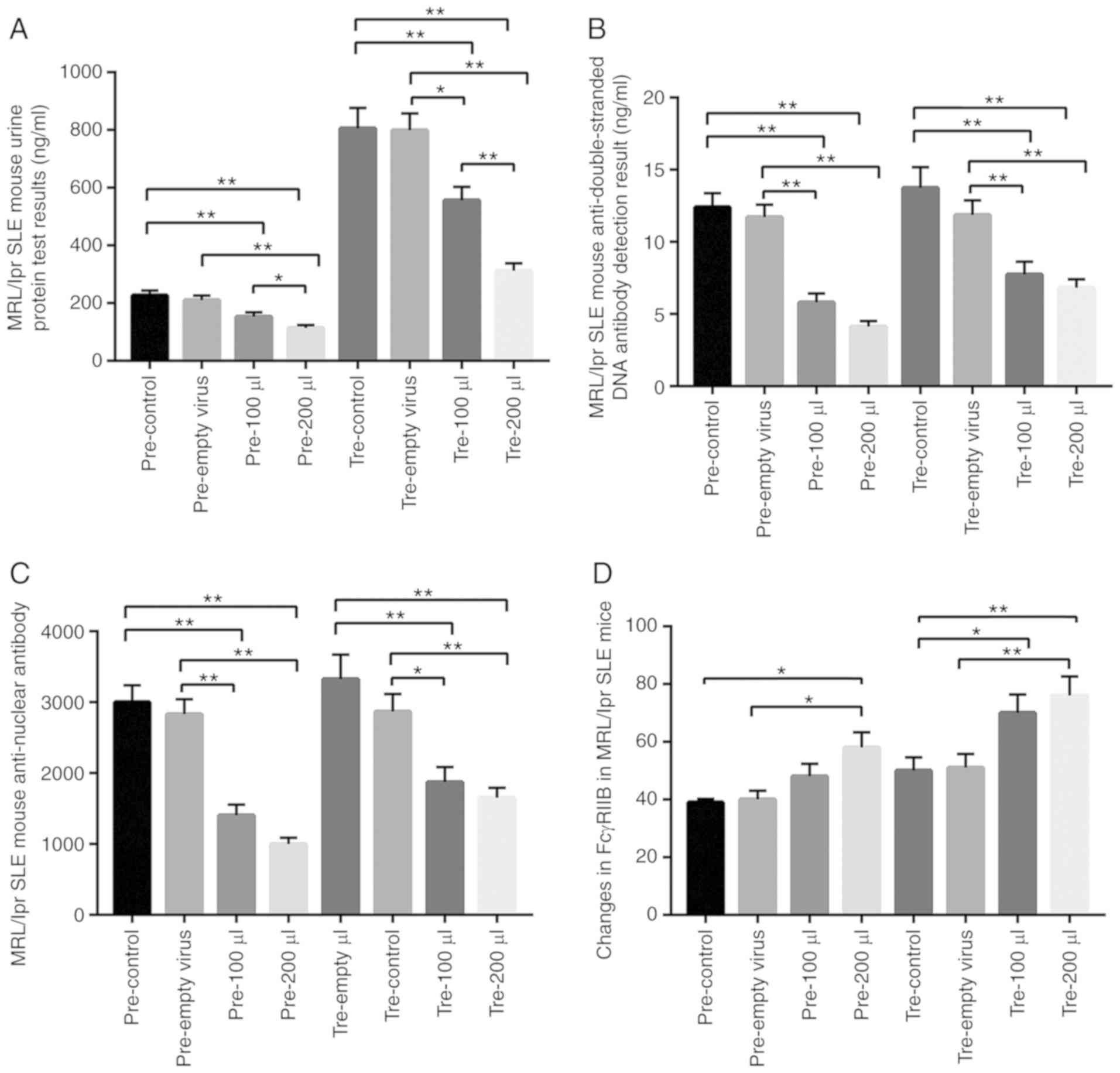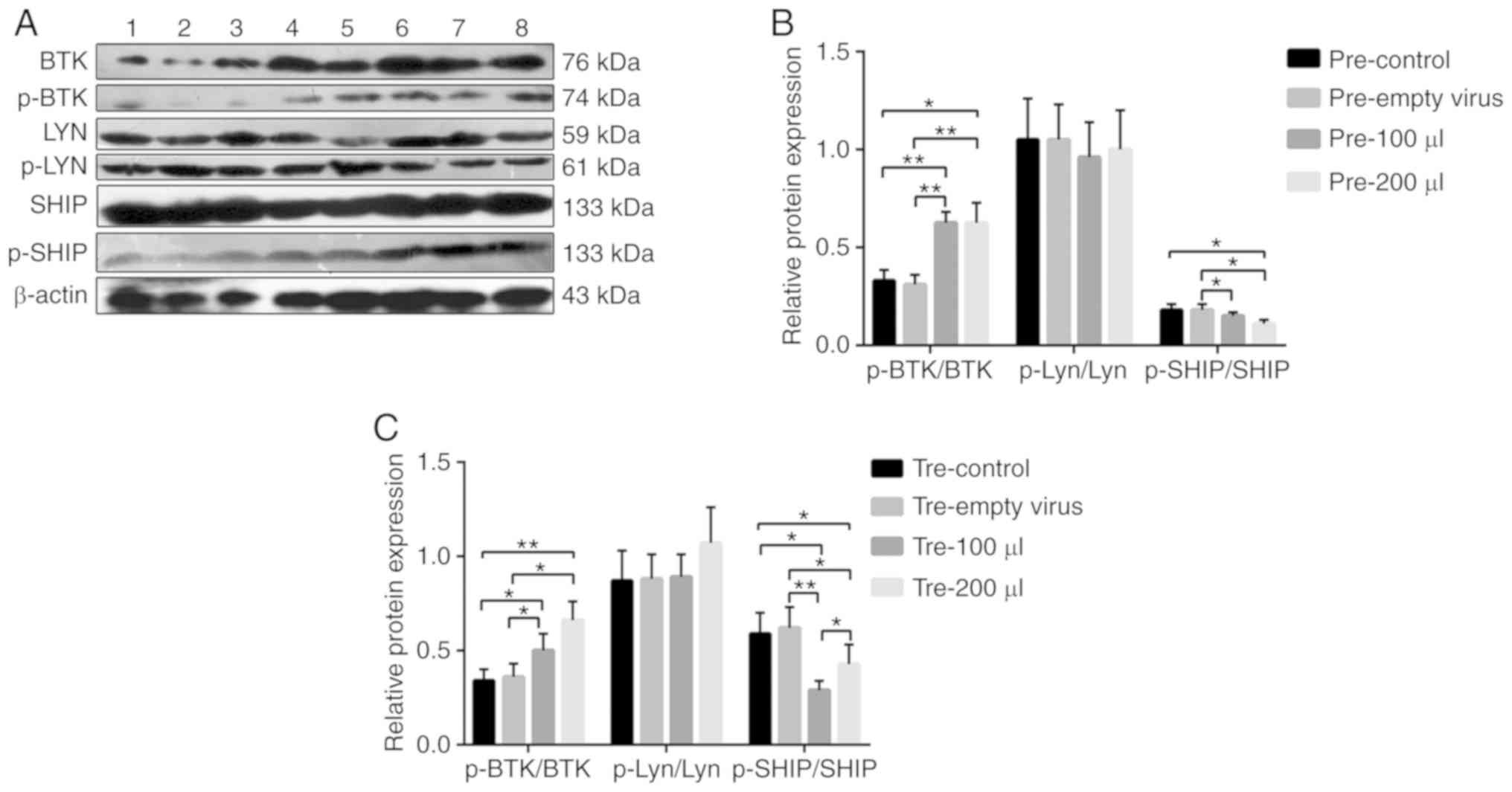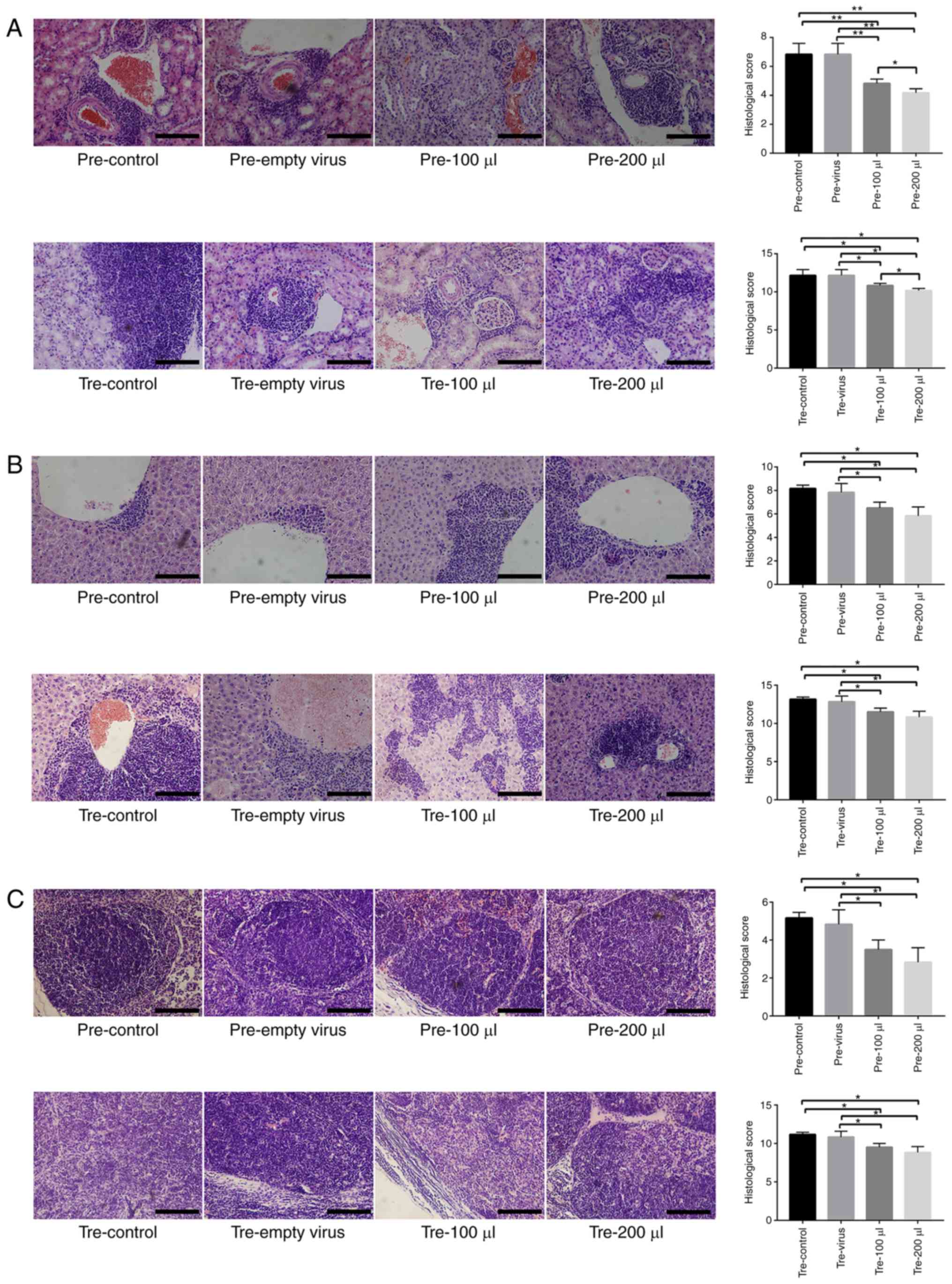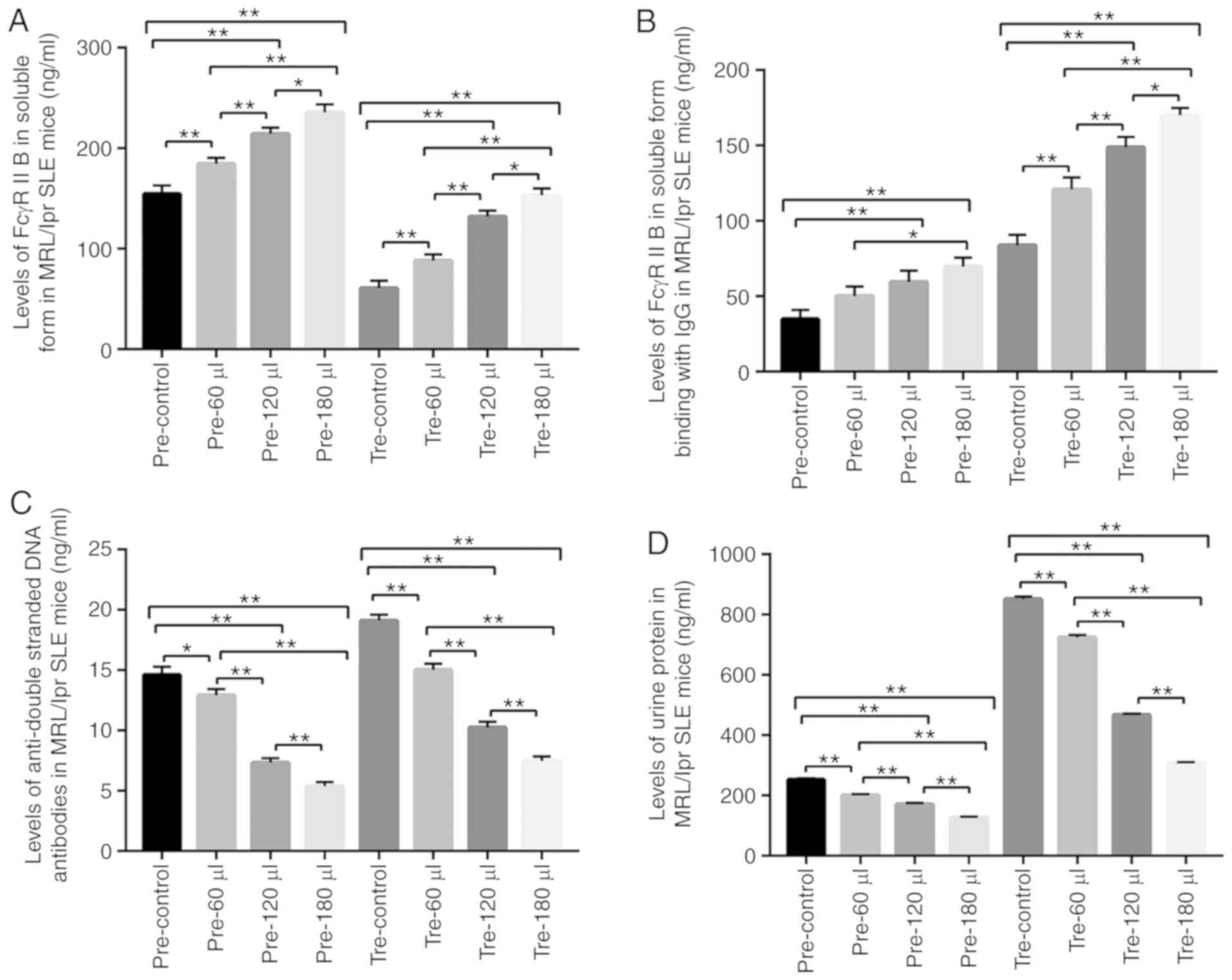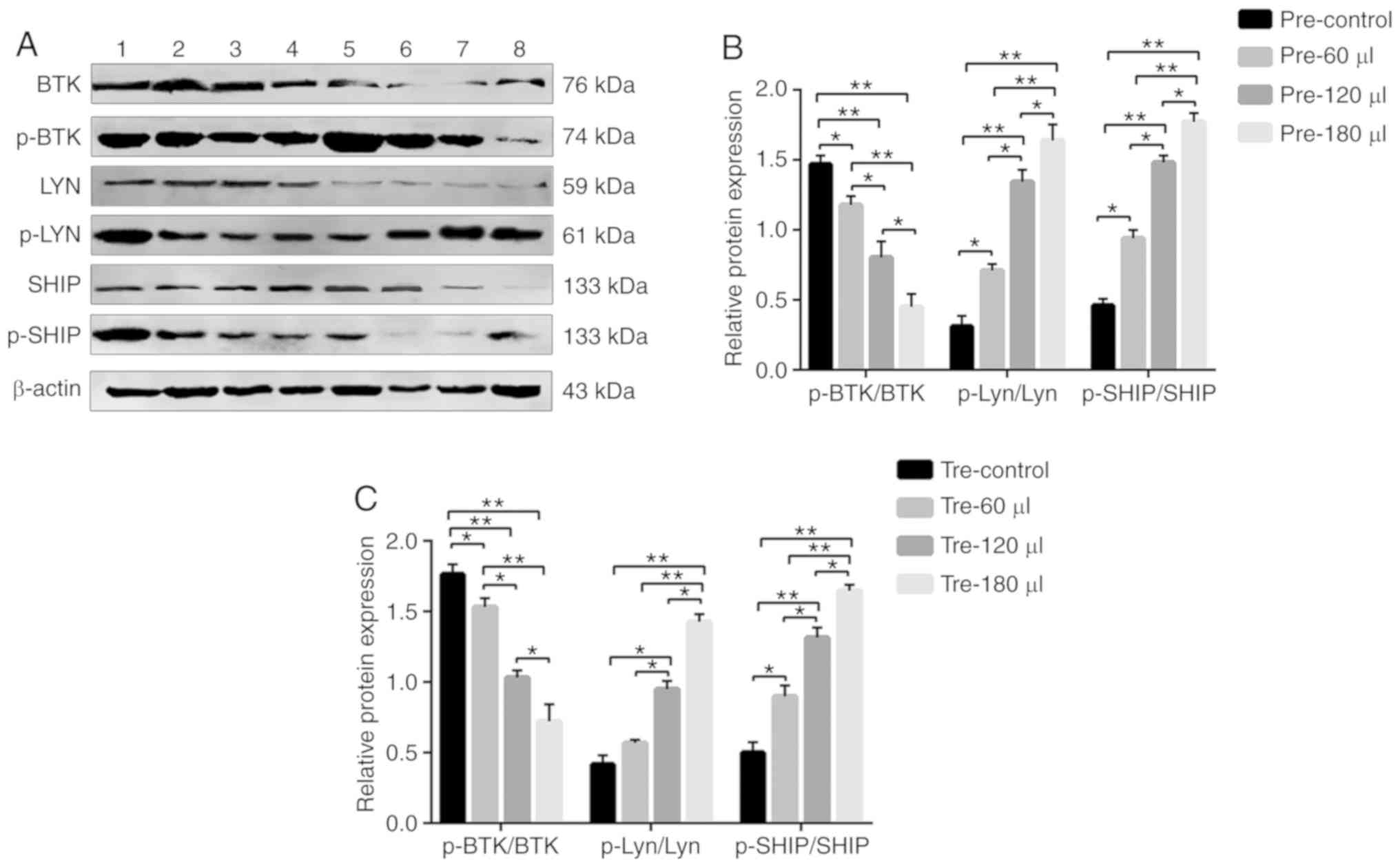|
1
|
Das CM, Bezerra MC, Braga FN, da Justa
Feijão MR, Gois AC, Rebouças VC, de Carvalho TM, Carvalho LN and
Ribeiro ÁM: Clinical and immunological aspects and outcome of a
Brazilian cohort of 414 patients with systemic lupus erythematosus
(SLE): Comparison between childhood-onset, adult-onset, and
late-onset sle. Lupus. 25:355–363. 2016. View Article : Google Scholar
|
|
2
|
Pamuk ON, Balci MA, Donmez S and Tsokos
GC: The incidence and prevalence of systemic lupus erythematosus in
Thrace, 2003-2014: A 12-year epidemiological study. Lupus.
25:102–109. 2016. View Article : Google Scholar
|
|
3
|
Dema B and Charles N: Advances in
mechanisms of systemic lupus erythematosus. Discov Med. 17:247–255.
2014.PubMed/NCBI
|
|
4
|
Park MJ, Kwok SK, Lee SH, Kim EK, Park SH
and Cho ML: Adipose tissue-derived mesenchymal stem cells induce
expansion of interleukin-10-producing regulatory B cells and
ameliorate autoimmunity in a murine model of systemic lupus
erythematosus. Cell Transplant. 24:2367–2377. 2015. View Article : Google Scholar
|
|
5
|
Park MJ, Lee SH, Kim EK, Lee EJ, Park SH,
Kwok SK and Cho ML: Myeloid-Derived suppressor cells induce the
expan-sion of regulatory B cells and ameliorate autoimmunity in the
sanroque mouse model of systemic lupus erythematosus. Arthritis
Rheumatol. 68:2717–2727. 2016. View Article : Google Scholar : PubMed/NCBI
|
|
6
|
McGaha TL, Ma Z, Ravishankar B, Gabunia K,
McMenamin M and Madaio MP: Heterologous protein incites abnormal
plasma cell accumulation and autoimmunity in MRL-MpJ mice.
Autoimmunity. 45:279–289. 2012. View Article : Google Scholar : PubMed/NCBI
|
|
7
|
Taher TE, Bystrom J, Ong VH, Isenberg DA,
Renaudineau Y, Abraham DJ and Mageed RA: Intracellular B lymphocyte
signal-ling and the regulation of humoral immunity and
autoimmunity. Clin Rev Allergy Immunol. 53:237–264. 2017.
View Article : Google Scholar : PubMed/NCBI
|
|
8
|
Sondermann P and Oosthuizen V: The
structure of Fc receptor/Ig complexes: Considerations on
stoichiometry and potential inhibitors. Immunol Lett. 82:51–56.
2002. View Article : Google Scholar : PubMed/NCBI
|
|
9
|
Xu L, Li G, Wang J, Fan Y, Wan Z, Zhang S,
Shaheen S, Li J, Wang L, Yue C, et al: Through an ITIM-independent
mechanism the FcγRIIB blocks B cell activation by disrupting the
colocalized microclustering of the B cell receptor and CD19. J
Immunol. 192:5179–5191. 2014. View Article : Google Scholar : PubMed/NCBI
|
|
10
|
Pauls SD, Ray A, Hou S, Vaughan AT, Cragg
MS and Marshall AJ: FcγRIIB-Independent mechanisms controlling
membrane localization of the inhibitory phosphatase SHIP in human B
cells. J Immunol. 197:1587–1596. 2016. View Article : Google Scholar : PubMed/NCBI
|
|
11
|
Lesourne R, Bruhns P, Fridman WH and
Daëron M: Insufficient phosphorylation prevents fc gamma RIIB from
recruiting the SH2 domain-containing protein-tyrosine phosphatase
SHP-1. J Biol Chem. 276:6327–6336. 2001. View Article : Google Scholar
|
|
12
|
Tackenberg B, Nimmerjahn F and Lunemann
JD: Mechanisms of IVIG efficacy in chronic inflammatory
demyelinating poly-neuropathy. J Clin Immunol. 30:S65–S69. 2010.
View Article : Google Scholar
|
|
13
|
Chu SY, Yeter K, Kotha R, Pong E, Miranda
Y, Phung S, Chen H, Lee SH, Leung I, Bonzon C, et al: Suppression
of rheumatoid arthritis B cells by XmAb5871, an anti-CD19 antibody
that coengages B cell antigen receptor complex and Fcγ receptor IIb
inhibitory receptor. Arthritis Rheumatol. 66:1153–1164. 2014.
View Article : Google Scholar : PubMed/NCBI
|
|
14
|
Gesheva V, Kerekov N, Nikolova K,
Mihaylova N, Todorov T, Nikolova M and Tchorbanov A: Suppression of
dsDNA-specific B lymphocytes reduces disease symptoms in SCID model
of mouse lupus. Autoimmunity. 47:162–172. 2014. View Article : Google Scholar : PubMed/NCBI
|
|
15
|
Soni C, Domeier PP, Wong EB, Shwetank,
Khan TN, Elias MJ, Schell SL, Lukacher AE, Cooper TK and Rahman ZS:
Distinct and synergistic roles of FcγRIIB deficiency and 129
strain-derived SLAM family proteins in the development of
spontaneous germinal centers and autoimmunity. J Autoimmun.
63:31–46. 2015. View Article : Google Scholar : PubMed/NCBI
|
|
16
|
Alegria-Schaffer A, Lodge A and Vattem K:
Performing and optimizing western blots with an emphasis on
chemiluminescent detection. Methods Enzymol. 463:573–599. 2009.
View Article : Google Scholar : PubMed/NCBI
|
|
17
|
Nossent HC and Rekvig OP: Is closer
linkage between systemic lupus erythematosus and
anti-double-stranded DNA antibodies a desirable and attainable
goal? Arthritis Res Ther. 7:85–87. 2005. View Article : Google Scholar : PubMed/NCBI
|
|
18
|
Sondermann P: The FcγR/IgG interaction as
target for the treatment of autoimmune diseases. J Clin Immuno.
36:95–99. 2016. View Article : Google Scholar
|
|
19
|
Wang J, Li Z, Xu L, Yang H and Liu W:
Transmembrane domain dependent inhibitory function of FcγRIIB.
Protein Cell. 9:1004–1012. 2018. View Article : Google Scholar : PubMed/NCBI
|
|
20
|
Roghanian A, Stopforth RJ, Dahal LN and
Cragg MS: New revelations from an old receptor: Immunoregulatory
functions of the inhibitory Fc gamma receptor, FcγRIIb (CD32B). J
Leukoc Biol. 6:10022018.
|
|
21
|
Zhang L, Cao XQ and Yang ZW: Preparation
and function of human soluble FcγRIIb. Xi Bao Yu Fen Zi Mian Yi Xue
Za Zhi. 28:952–925. 2012.In Chinese. PubMed/NCBI
|
|
22
|
Magnusson SE, Andren M, Nilsson KE,
Sondermann P, Jacob U and Kleinau S: Amelioration of
collagen-induced arthritis by human recombinant soluble
FcgammaRIIb. Clin Immunol. 127:225–233. 2008. View Article : Google Scholar : PubMed/NCBI
|
|
23
|
Magro-Checa C, Schaarenburg RA, Beaart HJ,
Huizinga TW, Steup-Beekman GM and Trouw LA: Complement levels and
anti-C1q autoantibodies in patients with neuropsychiatric systemic
lupus erythematosus. Lupus. 25:878–888. 2016. View Article : Google Scholar : PubMed/NCBI
|
|
24
|
Sun JB, Xiang Z, Smith KG and Holmgren J:
Important role for FcγRIIB on B lymphocytes for mucosal
antigen-induced tolerance and Foxp3+ regulatory T cells. J Immunol.
191:4412–4422. 2013. View Article : Google Scholar : PubMed/NCBI
|
|
25
|
Daëron M and Lesourne R: Negative
signaling in Fc receptor complexes. Adv Immunol. 89:39–86. 2006.
View Article : Google Scholar : PubMed/NCBI
|
|
26
|
Wong KE, Mora MC, Skinner M, Page SM,
Crisi GM, Arenas RB, Schneider SS and Emrick T: Evaluation of
PolyMPC-dox prodrugs in a human ovarian tumor model. Mol Pharm.
13:1679–1687. 2016. View Article : Google Scholar : PubMed/NCBI
|
|
27
|
Vásquez A, Baena A, González LA, Restrepo
M, Muñoz CH, Vanegas-García A, Ortiz-Reyes B, Abdoel N, Rojas M,
García LF and Vásquez G: Altered recruitment of lyn, syk and ZAP-70
into lipid rafts of activated B cells in systemic lupus
erythematosus. Cell Signal. 58:9–19. 2019. View Article : Google Scholar : PubMed/NCBI
|
|
28
|
Corneth OB, Wolternil RG and Hendriks RW:
BTK signaling in B cell differentiation and autoimmunity. Curr Top
Microbiol Immunol. 393:67–105. 2016.
|
|
29
|
Pauls SD and Marshall AJ: Regulation of
immune cell signaling by SHIP1: A phosphatase, scaffold protein,
and potential therapeutic target. Eur J Immunol. 47:932–945. 2017.
View Article : Google Scholar : PubMed/NCBI
|
|
30
|
Wang Q, Vogan EM, Nocka LM, Rosen CE, Zorn
JA, Harrison SC and Kuriyan J: Autoinhibition of bruton's tyrosine
kinase (Btk) and activation by soluble inositol hexakisphosphate.
Elife. 4:e060742015. View Article : Google Scholar :
|
|
31
|
Akiyama M, Suzuki K, Yamaoka K, Yasuoka H,
Takeshita M, Kaneko Y, Kondo H, Kassai Y, Miyazaki T, Morita R, et
al: Number of circulating follicular helper 2 T cells correlates
with IgG4 and interleukin-4 levels and plasmablast numbers in
IgG4-related disease. Arthritis Rheumatol. 67:2476–2481. 2015.
View Article : Google Scholar : PubMed/NCBI
|
|
32
|
Awe O, Hufford MM, Wu H, Pham D, Chang HC,
Jabeen R, Dent AL and Kaplan MH: Expression in T follicular helper
cells limits CD40L-dependent germinal center B cell development. J
Immunol. 195:3705–3715. 2015. View Article : Google Scholar : PubMed/NCBI
|
|
33
|
Iwata S and Tanaka Y: The importance of B
cell-T cell inter-action in autoimmune diseases. Nihon Rinsho
Meneki Gakkai Kaishi. 38:398–402. 2015.In Japanese. View Article : Google Scholar
|
|
34
|
Zhang M, Yu G, Chan B, Pearson JT,
Rathanaswami P, Delaney J, Lim AC, Babcook J, Hsu H and Gavin MA:
Interleukin-21 receptor blockade inhibits secondary humoral
responses and halts the progression of preestablished disease in
the (NZB x NZW)F1 systemic lupus erythematosus model. Arthritis
Rheumatol. 67:2723–2731. 2015. View Article : Google Scholar : PubMed/NCBI
|
|
35
|
Seda V and Mraz M: B-Cell receptor
signalling and its cross-talk with other pathways in normal and
malignant cells. Eur J Haematol. 94:193–205. 2015. View Article : Google Scholar
|















